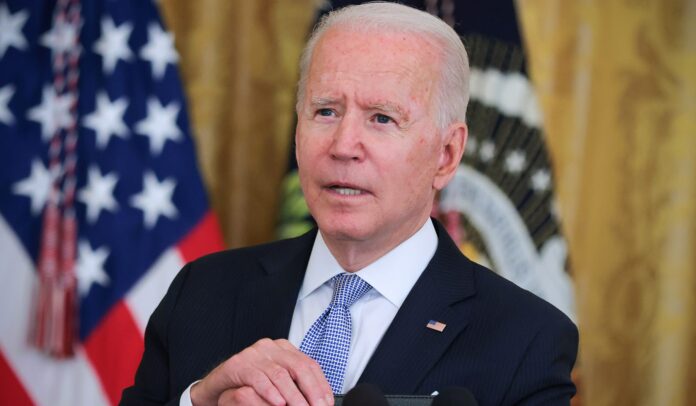President Biden’s goal of ending oil production in America doesn’t seem so slick right now. Gasoline prices are close to a dollar per gallon higher than this time last year, with oil prices just shy of the highest in seven years as demand has begun to pick back up after COVID. And with energy being a critical input into nearly every aspect of modern life, higher oil and gasoline prices only add fuel to this year’s inflationary fire.
But rather than let American oil producers step up to the plate, President Biden is calling on . . . the OPEC oil cartel to pump more oil. Evidently, he wants other countries to do the dirty work of drilling the oil for him. And he’s getting his way.
Consider the facts: The oil will be pumped, and the money will flow — but to whom?
Setting up a market in which OPEC can profitably sell more oil effectively creates a market opportunity for OPEC Plus (of which Russia is a part) and Iran. Both countries pose a strategic challenge to America — a challenge that is, in no small part, funded by those countries’ hydrocarbon riches. Oil and gas sales fund approximately half of Russia’s government as of 2019. (Its revenue dipped in 2020 due to COVID-19 but is positioned for a strong comeback in 2021.) The money helps underwrite aggression in Ukraine, in addition to cyberattacks on critical infrastructure in America and its allies, and emboldens reckless behavior by autocrats aligned with Moscow in sensitive parts of the world.
Iran has huge reserves of oil and gas, and as of 2018, exports of those commodities made up a quarter of the government’s budget. Iran uses this money to sponsor terrorist organizations that threaten American allies, to send warships toward the Caribbean to partner with Maduro’s Venezuela, and — whatever any agreements may say — to further its nuclear ambitions.
Offering OPEC Plus an opportunity to make more money is a head-scratcher. Russia and Iran would benefit from increased oil revenue; it would assist, too, in the funding of activities that have created foreign-policy headaches for years. But perhaps this shouldn’t be too surprising given that President Biden has already canceled the Keystone XL pipeline while giving Russia’s Nord Stream 2 pipeline a thumbs-up — a move that will simultaneously increase Europe’s dangerous reliance on Russian oil and hit Ukraine financially.
Biden would do better by letting American oil producers drill more oil and gas in response to price signals. But so far, his default has been to cater to the climate lobby. The president’s administration has suspended some past permits and is seeking to block future drilling permits on federal land (despite the latter running into legal difficulties), as well as using tighter endangered-species regulations to hinder drilling on private land. Reduced American oil production means higher oil and gasoline prices for everyone, Americans included.
Considering the implications, if ever there were a time for the administration to reconsider its restrictive stance on fossil-fuel production, this would be it. America has the long-term potential to produce more energy than it needs — and did so as recently as last year. This is an advantage that, in an increasingly treacherous international environment, makes no sense for the U.S. to throw away. (That’s not to mention, of course, that abandoning such an advantage would redound to regimes that do not wish us well.)
Biden’s position on fossil fuels stems from his wider climate agenda, and, more specifically to obligations flowing from the Paris agreement — obligations to which he recommitted the U.S. upon taking office. But America is already the world leader in energy-related emissions reductions since its emissions peaked in 2005, according to data from the BP Statistical Review of World Energy. This is largely due to the increased use of natural gas over coal. Ironically, President Biden’s policies would slow that transition and, by lowering production, make it more difficult for America to supply developing countries with this more environmentally friendly alternative.
But even under the Paris agreement, China would not be required to reduce emissions for many years, and Russia is simply not interested in cutting emissions as it pledged to do (and may even increase emissions), giving them a free pass while America pays. Their investments in boosting fossil-fuel production and usage are a reminder that their actions speak louder than words. Why tie one hand behind your back when your opponent will fight you with two?
Instead, “Oil for thee, but not for me,” is the message emanating from the White House. The president seems content to grant leverage to OPEC and our adversaries abroad rather than stand up to extremists in the climate lobby. In a way, President Biden is getting a preview of the strategic predicament in which his climate policies will place the U.S., but he doesn’t seem to be drawing the right lessons. That the result of his policies will be to switch hydrocarbon production from the relatively clean U.S. to far dirtier competitors abroad only serves to make his approach an environmental as well as a strategic blunder.
via nationalreview



